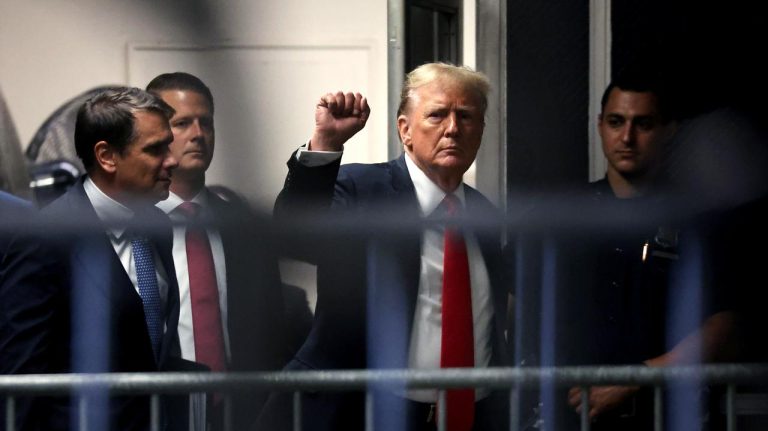Donald Trump, elected as the 47th president of the United States, is, as CNN reminds, a “convicted felon” who is “awaiting sentencing in a bribery case in New York and is still trying to avoid another prosecution.” to avoid state and federal charges.” Trump has pleaded not guilty to any of the charges against him. What will happen to his criminal and civil cases now?
This is a doubly unprecedented situation. Never before has a person accused of a crime been elected president of the United States. At the same time, until last year, no former president had been charged with a crime, CNN noted on the day Donald Trump won the presidential election. What will happen to his criminal and civil cases now?
“It's clear that the proactive effort to delay these cases has paid off,” said Jessica Levinson, a professor of constitutional law at Loyola Law School in Los Angeles.
Money judgment for Stormy Daniels
On November 26, Donald Trump must be sentenced in a New York court for falsifying business records to hide a hush-hush payment to Stormy Daniels during the 2016 election campaign, which he accused of having an affair, why Trump denied.
It remains an open question whether a verdict will be announced or not. Judge Juan Merchan has set himself a deadline of November 12 to decide whether or not to do so. The reason for this is the Supreme Court's ruling on partial immunity for presidents. If Merchan overturns the conviction, the charges will be dismissed and Trump will not be convicted.
However, if the judge decides to uphold the sentence, the former president's lawyers are likely to ask Merchan to delay the announcement so they can appeal. Appeals can take months.
However, Trump could face up to four years in prison if Merchan is convicted. However, the judge is not required to sentence the president-elect to prison and may impose a lighter sentence: probation, house arrest, community service or a fine.
As CNN points out, any ruling would be complicated by the fact that Trump is set to take office on January 20, 2025. His lawyers “will likely prepare their appeal to raise constitutional questions about whether a state judge can convict an elected president, which could keep the case in the courts for years.”
Because this is a state issue, Trump does not have the right to pardon himself after he is sworn in.
Trying to invalidate the 2020 election and withhold secret documents
Trump's victory in the election will have a major impact on the two criminal cases brought against him by special prosecutor Jack Smith in Washington and Florida. These are charges related to trying to invalidate the 2020 presidential election and withholding classified documents after leaving the White House.
As CNN points out, Trump's main strategy was to delay the proceedings until after the election. If he becomes president, he could fire Attorney Smith, which would end both cases. At the end of October, the former president said that he would take such actions without any hesitation. – Oh, it's that simple. It's that simple, Trump said when radio host Hugh Hewitt asked him if he would “fire” Jack Smith if re-elected. “I'll fire him in two seconds,” Trump said.
Smith's dismissal allows the Justice Department and the attorney general to drop the charges against Trump and end the legal proceedings. But Smith will have until his inauguration on Jan. 20, 2025, to consider his options. One of the primary issues is whether the Justice Department's Office of Legal Counsel believes that the president-elect is afforded the same legal protections from prosecution as the current president.
Accused of attempting to interfere in the election results in Georgia
In August 2023, the former president faces 13 charges related to attempting to interfere in the election results in the state of Georgia, including violations of provisions of the Organized Crime Act, conspiracy to defraud, perjury and encouraging public officials to violate their oath of office.
That trial was halted after lawyers for one of the defendants, former Trump campaign adviser Mike Roman, revealed in February 2024 that District Attorney Fannie Willis and Special Prosecutor Nathan Wade, who led the investigation, had a “romantic relationship.” . They then demanded that both prosecutors be removed from the case.
For now, according to CNN, “it is unlikely that a state-level judge will allow the trial to proceed while Trump is president.” However, if he allows it, Trump's lawyers will surely request that the case be dismissed.
There is no clear answer to the question of whether a state-level prosecutor like Fannie Willis can prosecute a sitting president.
Harassment, defamation, fraud
The former president is also defending himself in many civil courts. Trump filed two cases against the writer E. Jean Carroll lost in federal court in 2023 and 2024 after a jury found her liable for sexually harassing and subsequently defaming a journalist. Two juries awarded Carroll $5 million and $83 million. Trump's representatives have filed a complaint and the cases are pending.
The second case concerns fraud in the amount of 454 million dollars. In late September, an appeals court heard arguments as part of Trump's bid to overturn a conviction in a civil case in which a judge found that he, his teenage sons and his company inflated the value of assets to get better loan and insurance rates. get The Court of Appeal has not yet issued a decision.
Trump also faces civil lawsuits from Democratic lawmakers and others over his role in the Jan. 6 attack on the Capitol.
As CNN points out, it's possible that all of these cases will continue even as Trump serves his second term in the White House. In a 1997 Supreme Court decision, the justices unanimously held that sitting presidents cannot use presidential immunity to avoid civil prosecution while in office.
Featured image credit: Spencer Platt/Getty Images/Bloomberg via Getty Images

